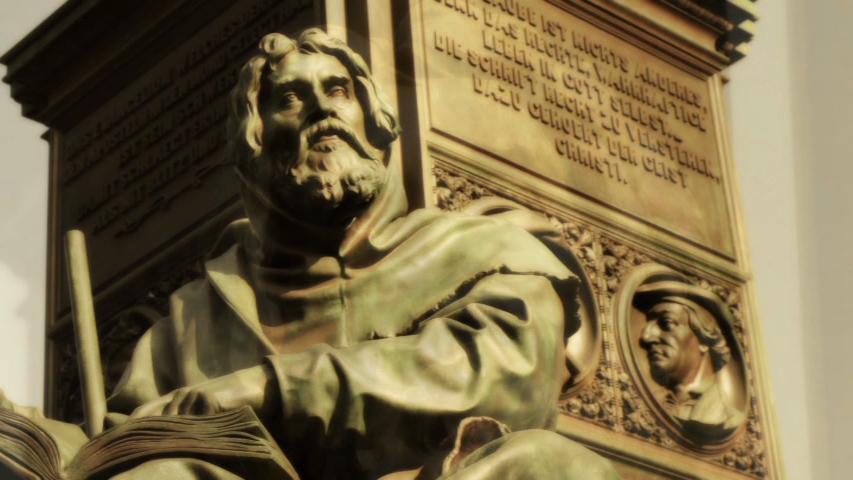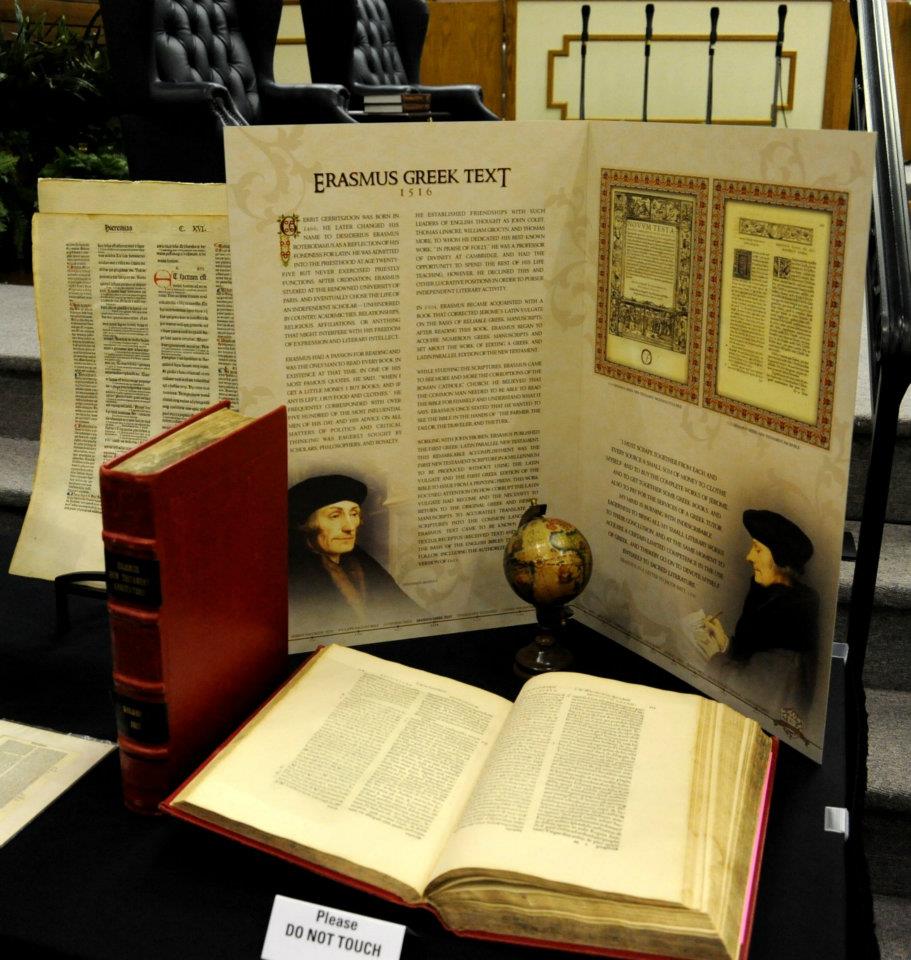|
"III.--VERSIONS OF THE SCRIPTURES IN THIS LANGUAGE.
Owing, perhaps, to the extreme difficulty of producing a
faithful and satisfactory French version,
the attempts that have been made to translate the Scriptures into this
language are particularly
numerous. The first translation of which we have any definite account
is ascribed to the twelfth
century; and portions of it, with other ancient writings, were published at
Paris, in 1842, by Leroux
de Lincy, under the title of "The Four Books of
Kings." ....
The Historia Scholastica of Peter Comestor, which is a popular
compendium of scriptural
history was translated by Guiars des Moulins, between the years 1291 and 1294,
and several MS.
copies are preserved in the Royal Library at Paris: this work, which is
generally known as "La Bible
Historiale," was printed by command of Charles VIII. of France, in
1487. Among the Lansdowne
MSS. in the British Museum, is a fine copy of a translation of the Bible as
far as the Psalms, executed
by Raoul de Presles, by command of Charles V. of France."--1860
S. Bagster [Info only]
"All these translations were
superseded by a version of the entire Scriptures published at
Antwerp,
in consecutive portions, between the years 1512 and 1530, by Jaques le Fevre
of Estaples, commonly
called Jacobus Faber, Stapulensis. Faber translated from the
Latin Vulgate, which he has followed
so closely that many of his passages appear obscure. This version is
the basis of all other French
versions, Protestant as well as Catholic, which
have since been published: it was reprinted in 1534
and 1541; and was revised and published by the divines of Louvain in
1550."--1860 S. Bagster [Info only]
"The following is a list of the
principal translations of the Scriptures into French which have
appeared since the publication of Faber’s version:--
1535. Olivetan’s version....
Several other revisions have been published; but, of these, by far the
most
important is the one familiarly known as the "Geneva
Bible." It appeared at Geneva
in 1588, after having been corrected by the College of Pastors and Professors
of the
Reformed Church at Geneva
(Beza, Goulart, Jaquemot, Bertram, La Faye, and
Rotan).
The individuals engaged in this revision are said to have consulted the
rabbinical
writers, and the Latin versions of
Munster and Tremellius, besides the sacred
originals:
they succeeded in imparting a greater degree of elegance and precision to the
language,
and corrected some of the errors of Olivetan.
1555. Castalio published a French translation of his own
Latin version; but this work scarcely
deserves a place in the list of French versions, as it is disfigured by
serious errors, and
never rose into repute. Castalio is even charged with having invented
French words,
for the purpose, as he thought, of expressing the full force of the Greek.
In 1562, a
translation was published, in French, of Diodati’s
Italian
version.
1641. A translation of the entire [b]ible from the
Vulgate, ....
1649. Du Marolles published a New Testament, professedly translated from the
original; but, as
he did not understand the Greek language, it is believed that he merely made
a
translation of Erasmus’s
Latin Testament, which was drawn
immediately from the
Greek text. In some places
he seems to have conformed to the
Vulgate.
1666. Father Amelotte published a translation
of the [n]ew [t]estament, which is well known to
have been executed from the Vulgate,
although he pretended that he had consulted
Greek MSS. of the highest antiquity. This version is far from being
faithful or
accurate: he often uses great circumlocution, and in many
instances inserts words
which are not in the original, without writing them in Italics.
1667. The celebrated version of the New Testament from the
Vulgate, by De Sacy and other
Port-Royalists, was printed by the Elzevirs, at
Amsterdam, for Migeot, a bookseller of
Mons; whence it is often called the Mons Testament. It appeared under
the approbation
of Cardinal Noailles, and it is still held in high repute, and has passed
through many
editions. De Sacy was confessor to the Society of Port Royal; he was
involved in the
persecution raised against that Society by the
Jesuits, and was thrown into
the Bastille
in 1666. It was here, during his confinement for two years and a
half, that he under-
took his translation of the Bible. He finished the entire version of
both Testaments on
the Eve of All Saints, 1668, the day of his liberation from imprisonment.
His version
has often been condemned by the
Jesuits as too favourable
to Protestantism, but in
France it is generally regarded as "the
most perfect version in French, or in any other
tongue." De Sacy’s character as a translator has been thus
drawn:--"In a critical
knowledge of the sacred text, he may have had many superiors; but none in
that
exquisite sensibility to the grandeur, the pathos, the superhuman wisdom, and
the awful
purity of the divine original, without which none can truly apprehend, or
accurately
render into another idiom, the sense of the inspired
writers."
1668. ...from
the Vulgate: ....
1671-1680. ...from the Vulgate, taking as
a basis that of De Sacy, and appending....
1686. A New Testament, wilfully falsified to agree with
Roman Catholic dogmas, was published
at Bordeaux, by the Jesuits,
and was intended for those Protestants who, after
the
revocation of the edict of Nantes, in 1685, had been compelled, by torture
and other
means, to embrace the Roman Catholic religion. Nearly the whole of
this edition is
supposed to have been destroyed, yet no fewer than nine copies are known to
be still
in existence in England and Ireland.
1696-1707. Martin revised the Geneva Bible....
1697-1703. ....
1702. ....
1709. ....
1718. A Protestant version of the New Testament,
remarkable for its closeness and accuracy,
was executed from the original text by Beausobre and L’Enfant, and
published at
Amsterdam. An English translation of the preliminary dissertation and
of the gospel
of Matthew, belonging to this
version, was printed at Cambridge in 1779.
1724. Ostervald....
1741. ....
1820-1824. ...., executed mainly from the Vulgate,
and written in....
1822. The Bible Society for the Canton-de-Vaud, after an uninterrupted labour
of four years,
published a revised edition of 10,000 copies of the entire French Scriptures.
The
revision was conducted by four clergymen, who availed themselves of the
researches of
oriental scholars, and of various critical aids that did not exist when Martin (and, after
him, Ostervald) revised the old version of Olivetan. Many errors, however, crept into
this version, which were pointed out by Mr. Haldane, and in consequence of
these
inaccuracies, and of notes appended to it, it was
repudiated by the parent Society.
1839. The Lausanne revision of the Scriptures was published by an association
of Swiss
ministers of the gospel at Lausanne. The object of this revision was
partly to accom-
modate the obsolete style of older editions to the modern idiom; but many of
the
emendations partake of the character of a paraphrase." --1860 S.
Bagster [Info only]
"A revision of former versions, so
carefully corrected as to be essentially a new version, was
published, (the New Testament in 1842 and the Old Testament in 1850), at
Paris, by the Society for
Promoting Christian Knowledge. The Society was induced to undertake
this revision chiefly in con-
sequence of a statement laid before them in 1835, by which it was shown that
no less than four different
versions of the Holy Scriptures were used indiscriminately in the Channel
Islands; and that at least
ten distinct versions were in use among French Protestants, occasioning much
confusion, not to say
evil, in their churches, schools, and families.
Martin’s revision was selected by the Society as the
basis of the new edition, because it approaches the nearest to the
English version.
Many other corrected editions and re-publications of the French
Bible, several of which were
executed, more or less, at the expense of the British and Foreign Bible
Society, might be here
enumerated, did our limits permit. The above list, however, may
suffice to indicate the revisions in
which the emendations are of sufficient importance to claim for them in any
degree the character
of new versions. ....
Ostervald’s version
is in
general use among the French Protestants of Switzerland, while the
Protestants in the south of France,
and those of Holland and Belgium, prefer Martin’s revision."--The Bible of Every
Land. (1860, Second Edition) Samuel Bagster [Info only]
|

